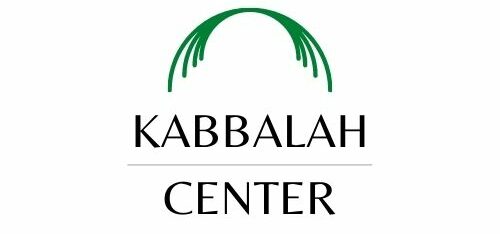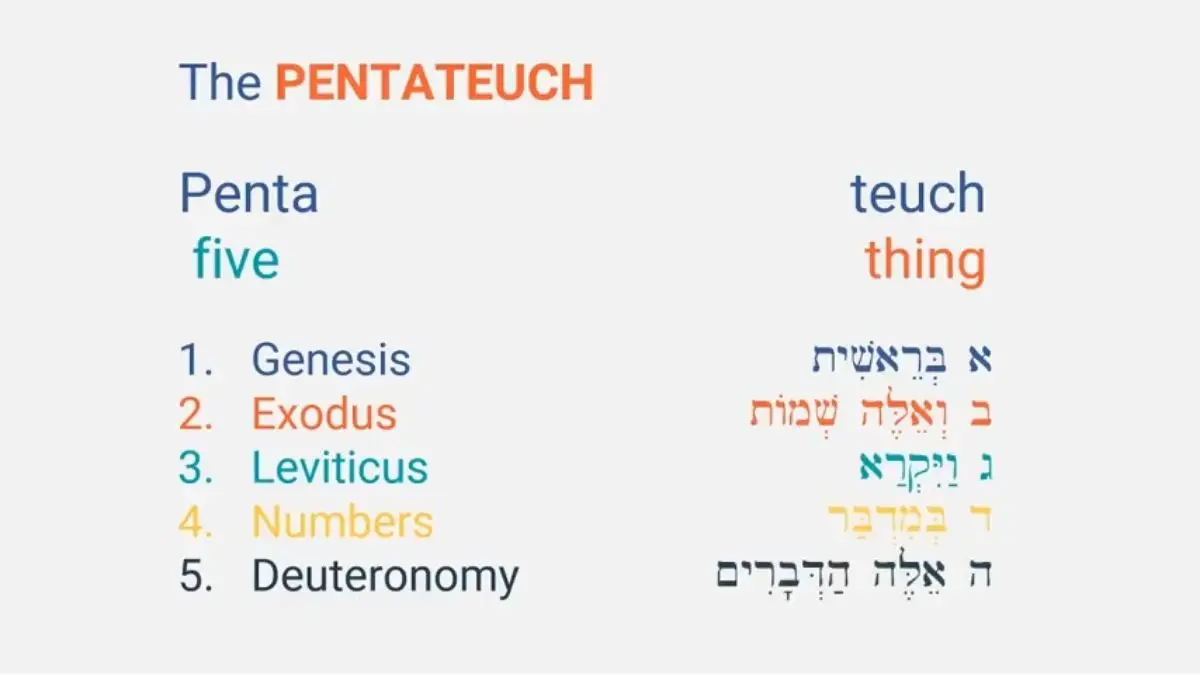Pentateuch laws
What are “Pentateuch laws” ? The Pentateuch, is the first five books of the Bible and it is the heart of the Mosaic law.
You may have recognized the word Penta, you see it in pentagram, which is a five pointed star, or a Pentagon, a five sided building in the United States. So it should come as no surprise that penta means five.
What is teuch? Well, we don’t really know. But we do know it refers to the five books that make up the Pentateuch: Genesis, Exodus, Leviticus, Numbers, and Deuteronomy.
Torah: first five books of the bible
The dictionary definition of Torah is law, but it can also be understood as guidance or instruction.
Now, the Torah or the pentateuch is the first part of every Bible, be it a Christian Bible or a Jewish Bible. And though the order of the books later in the Bible differ somewhat, up to this point, Jewish and Christian Bibles are identical.
Torah and pentateuch differences
Are the Torah and Pentateuch the same thing? Basically, there are similar, but have some differences.
Even though in both cases, the Pentateuch or the Torah is at the beginning of the Bible, their function is somewhat different. And though pentateuch and Torah mean the same thing, and I often use them interchangeably. In this section, I will try to call it penta chook when discussing Israel in the Christian canon, and I will try to refer to it as Torah when discussing the Jewish canon.
So let’s talk about how the pentateuch functions in Christian canons. The pentateuch is the first of four blocks of books followed by the New Testament. for Christians, the idea is relatively simple. After Deuteronomy, you start with history, since that is what they take away from the pentateuch.
It begins the history with creation. And then through the patriarchs, Moses and the Exodus, it ends at the border of the land. Then Joshua, Judges, Ruth, Samuel and kings continue that history. karagoz repeats it. And then Ezra, Nehemiah, and Esther completed. And then at this time for reflection on the presence with a section of poetic wisdom books, and finally, a look to watch the future with the prophetic books. And then, at the end of malikai, there is a messianic prophecy, which opens the door to the New Testaments.
When we take a quick look at the New Testament, we see a similar build up with the Gospels and acts discussing past events, namely the life of Jesus and the early church, followed by the presence, the letters instructing the church on how to live today. And finally, the book of Revelation, talking about the future.
So the primary function of the pentateuch in the Christian Bible is to set forth a historical perspective of God beginning to reveal himself to his people, which ultimately culminates in Jesus of Nazareth as the ultimate revelation of God.
The Jewish canon has a different setup. For though it starts with the Torah. It then continues with prophetic books, called the Navy, namely Joshua, Judges, Samuel kings, Hey, wait a minute, what those historical books? Well, they can be. And they certainly cover a lot of history.
What is more important, describing past events, or evaluating and interpreting past events, historians would agree that no description of the past is completely devoid of evaluation or interpretation. Not that it is only evaluation and interpretation.
Whether it’s the selection of the topic, the selection, of which materials to include in which to leave out the order in which the material is to be presented, and decisions on how much text is to be spent on which events.
All of these are part of a subjective interpretation of past events. Anyway, these historical books are seen as the early prophets, because it is the interpretation, the prophetic interpretation of history, that is important. They are then followed by the later prophets or the writing prophets. And then the third part of the Hebrew Bible, where the writings or the cut of him this is basically whatever else. This includes historical books like Ruth and Christ.
Nicole’s wisdom of poetic books like the Psalms and Ecclesiastes these, and of course, the prophetic ish book of Daniel.
Now all these books are considered a canonical or sacred by all Jewish denominations, yet in practice that the rabbi received by far the most attention.
Several Jewish denominations have the habit to read a part of the Torah, every Shabbat in the synagogue, often reading from beginning to end in a one year cycle, or a three year cycle.
Together, the Torah, the never him and the cut of him. That is, the law of the prophets and the writings from the “Tanach” does a nice little acronym for you.
So there you see the difference. In the Christian tradition, the Pentateuch stands at the beginning of a journey, going from the past, through the present into the future. Well, in Judaism, the Torah is at the center, and everything else circles around it. Now personally, I think that the rock can be used in both of those ways.
It can very well function as the beginning of a journey, and it can function as the center of attention, a beginning because history clearly continued after Moses his death, and there is also an internal progression of events. At the same time, I can see that no single major theological theme that is developed later in the Bible, either in the rest of the Old Testament or in the New Testament, does not have its roots in the first five books.
Perhaps, in order to do justice to both legitimate uses of the Torah, or the Pentateuch. You could also argue that the Torah or depend the Juke is a foundation for the rest of Scripture and theology. So this is how the Torah or the penta juke is used, and can be used.
As for the content or the meaning, I would want to focus on three main points. First of all, I want to look at the law aspect of the Torah. Then I want to look at the historical function of the Pentateuch, and finally, I want to look at what could be perhaps the most important theological notion independent juke, namely the idea of the covenant. Regarding the laws that are founded that the raw, they come in all sorts of shapes and sizes.
As we have seen, a large number of laws and regulations relate to the cult, either directly, for example, regarding the construction of the tabernacle, and the bringing of sacrifices, or indirectly, for example, the regulations regarding clean and unclean and how to live holy lives. Now, the function of the codes is to reinforce or affirm the covenant relationship between God and the covenant people. So these rules exist to support the covenant and govern how the covenant people are to interact with God.
Another set of rules that occasionally overlaps with the previous set consists of the rules that govern the organization of the covenant community. This includes laws like don’t murder and don’t steal, and occasionally spelling out punishments for certain transgressions. This sometimes spills over into what might be called a primitive political theory, or perhaps a very rough draft of a constitution, like allowing the Israelites to choose a king, and a final set of rules that I want to focus on other so called group identity markers.
These are rules and regulations that can be part of either of the two previously mentioned groups, but they also have a function of explicitly showing that they belong to the covenant community. The first and most famous example is that of circumcision. Another example is this celebration of the Shabbat, or one can point to certain hair and clothing requirements, like they should have little brushes on the corners of their clothes, what are they should not shave the four corners of their pitch. Now, this is not to say that these categories are explicitly mentioned in the text, or that certain laws cannot be more than one category. But it does show that the main purpose of these laws is to organize various relationships, the relationship between God and the covenant community, the relationship among the people of the covenant community, and the relationship between the covenant community and the people of the other nations.
Moving to the realm of history, the Pentateuch clearly describes a lot of events that can be classified as history. Obviously, Genesis covers a lot of history, from the creation of the world to the death of Joseph in Egypt, but the event of the Exodus is clearly Central. In fact, the story of the Exodus is in many ways, the most important event in the history of Israel. No other event in Israel’s past is referenced as
Often as this, it is referenced all over the historical books, the prophetic books and the poetic books. And this intro of the Exodus continues in the New Testament as well. And these can take the forms of references, retellings or moments where the exodus story becomes a model by which is to describe more recent historical events, like the Babylonian exile.
For Israel, the human hero is, of course, clearly Moses, but ultimately, it is God. In any case, the sensuality and importance of this narrative, independent yoke, and the rest of the Old Testament says a lot about the identity of Israel and how they saw themselves.
Most importantly, it saw itself as the beneficiary of the saving act of a merciful and faithful God. And finally, I want to have a quick look at the covenant. There are roughly three types of governance. There is a covenant between two equal partners, like a marriage or a business transaction. There is a covenant between a king and a beneficiary, sometimes called a royal gift covenant, and there is the covenant between a victorious king and a conquered King.
For much of the pentateuch, the second type of Covenant is revert to where God is a king, and it gives something for free to Israel. Now there are conditions for maintaining the covenant, but not for obtaining it. And this idea of a royal gift covenant goes back to Abraham, and before that to Noah, and some would argue it can even go back to creation itself. But then later, when Israel rebels against God, and his covenant, the tone shifts so much to the type of covenants of a conquering King, a type of covenant that even dictated the macro structure of a book like Deuteronomy.
Regardless of the precise type of Covenant we are talking about, both the Old and New Testament constantly refer back to this idea of a covenant. In fact, the word testament itself means covenant. To give you an idea of how dominant this theme is, and this also makes the biblical religions, both Judaism and Christianity, so unique among their contemporaries, because they are covenant religions. For in all other religions, the favor of the gods had to be initially earned. But here, God initiates relationship with his people and obliges himself to them.


